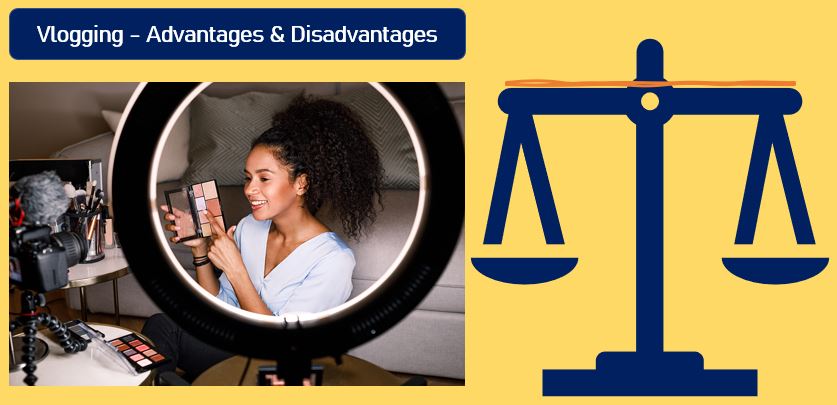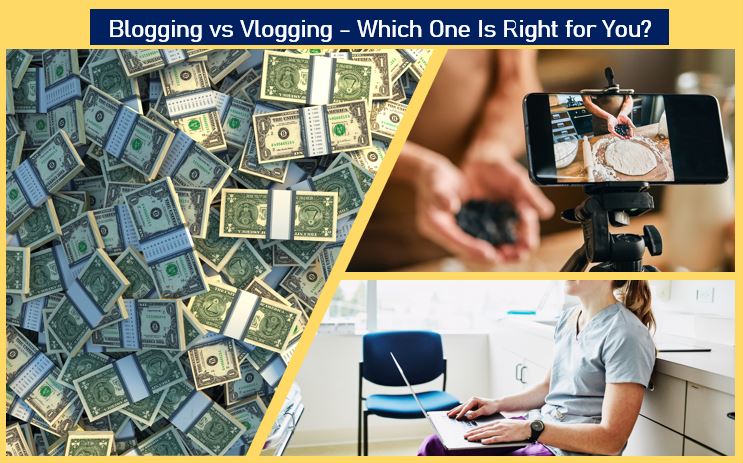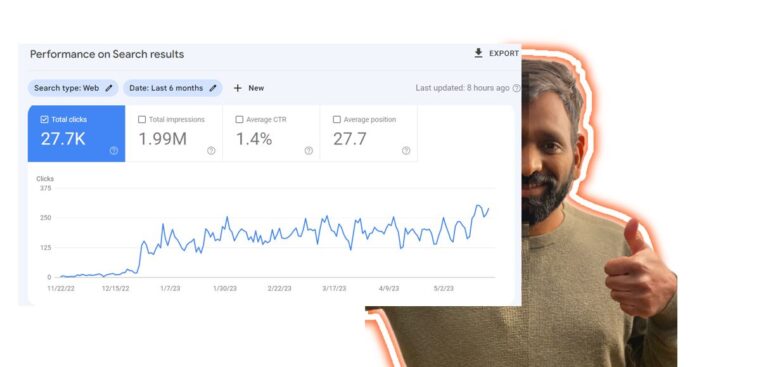Blogging vs Vlogging – Which Is Better For You In 2023?

Creating content has become a popular avenue to build a personal brand, promote products or services, and engage with a wider audience. While there are several ways to create content, two popular options include blogging vs vlogging.
Blogging refers to writing articles or posts and publishing them on websites, whereas vlogging involves creating video content and sharing it on platforms like YouTube, TikTok, or Instagram. For those looking to enhance their vlogging content, using an online video editor can significantly streamline the process, making it easier to produce high-quality videos that captivate your audience.
Both options have their own benefits and drawbacks, and choosing which one is right for you depends on factors such as your goals, resources, and communication style.
In this blog, we’ll review both options and help you choose the right option for you between a blog vs vlog.
Advantages and Disadvantages of Blogging

Blogging has become an increasingly popular way to share written content online. Whether you’re a freelance writer looking to showcase your work on a personal blog or a business owner seeking to promote your products or services via a business blog, blogging offers a flexible platform that can be adapted to suit your needs. However, while blogging offers several advantages, it also comes with its own set of challenges.
Advantages of Blogging
Easily Consumable and Sharable Content: Written content is easy to read and can be shared across various social media platforms. This means that your content can reach a wider audience and be easily consumed by your readers and can be a great online marketing tool.
User-Friendly Blogging Platforms: Blogging platforms such as WordPress, Squarespace, or Wix are user-friendly and do not require advanced technical skills. This means that even if you have little to no technical knowledge, you can still create and publish quality content on your blog.
SEO Optimized Content: Blogging allows you to optimize your content for search engines using SEO tools. This means that your blog posts are more likely to appear in search engine results pages, which can help increase your website’s traffic and visibility.
Income Potential: Blogging offers several opportunities to make more money, including sponsored posts, affiliate links, and online courses. By building a large readership base, you can monetize your blog and generate income through various means. Many bloggers have built successful affiliate blog, or use hybrid methods like google adsense if there is high traffic. The ones that focus on a niche blog tend to sell service courses to monetize the traffic.
Disadvantages of Blogging
Strong Writing Skills Required: Creating engaging written content requires strong writing skills. If you are not confident in your writing abilities, it may be challenging to produce quality content that engages your readers and keeps them coming back for more.
Time-Consuming: Building a readership base takes time and effort. This means that you need to consistently create quality content that resonates with your target audience to build a strong following. Additionally, blogging requires consistent effort and dedication, as you need to publish regular content to keep your readers engaged.
Monetizing a Blog Requires a Large Audience Base: Monetizing your blog often requires a large audience base. This means that you may need to spend time and effort building your readership before you can start earning money through sponsored posts, affiliate links, or online courses.
FAQs about blogging
How do I get started with blogging?
To get started with blogging, you first need to choose a blogging platform and domain name. Once you have a platform and domain name, create quality content that resonates with your target audience. Additionally, use SEO tools and social media platforms to promote your blog and grow your readership.
Which blogging platform should I use?
There are several blogging platforms available, including WordPress, Squarespace, and Wix. Choose a platform that aligns with your needs and budget.
Can I make money from blogging?
Yes, there are several ways to make money from blogging, including sponsored posts, affiliate links, and online courses. However, monetizing your blog often requires a large readership base.
How often should I publish new content on my blog?
Consistency is key when it comes to blogging. Aim to publish new content at least once a week to keep your readers engaged and maintain your website’s visibility in search engine results pages.
What topics should I write about on my blog?
Choose topics that align with your interests and expertise. Additionally, consider what your target audience is interested in and cater your content to their needs.
How do I promote my blog?
Promote your blog by using social media platforms, email marketing, and content marketing strategies. Additionally, use SEO tools to optimize your blog content for search engines.
How do I build a readership base?
Building a readership base requires consistent effort and dedication. Create quality content that resonates with your target audience, use social media platforms to promote your blog, and engage with your readers through comments and feedback.
What is the ideal blog post length?
The ideal blog post length varies depending on the topic. However, aim to write at least 500 words to ensure that your content is informative and engaging.
How do I optimize my blog for search engines?
Optimize your blog for search engines by using SEO tools, including keywords, meta descriptions, and alt text for images. Additionally, ensure that your website is mobile-friendly and has a fast loading speed.
Can I use images and videos in my blog posts?
Yes, using images and videos in your blog posts can help make your content more engaging and shareable. However, ensure that you have the necessary permissions and rights to use any images or videos in your blog.
Advantages and Disadvantages of Vlogging

In recent years, vlogging has become increasingly popular due to platforms like YouTube and TikTok. Vlogging allows creators to share video content online, which can be highly engaging and shareable. However, while vlogging offers several advantages, it also comes with its own set of challenges.
Advantages of Vlogging
Highly Engaging Visual Content: Vlogging allows creators to communicate with their audience through visual content. Viewers can see the creator’s body language and facial expressions, making it easier to connect with them emotionally. Additionally, viewers can see the location and surroundings in which the video is filmed, which adds to the overall experience.
Affordable Equipment: Video editing software and other equipment required for vlogging, such as cameras and microphones, have become more affordable and accessible. This means that even if you are on a tight budget, you can still create high-quality video content. Many YouTube videos have become successful even without using a camera (faceless videos).
Multiple Platforms Available: Vlogging can be shared across multiple platforms such as YouTube, Instagram, and TikTok. This allows creators to reach a wider audience and to promote their content across different platforms.
Monetization Options: There are several ways to monetize a vlog, including advertising revenue, sponsored content, channel memberships, and branded merchandise. By building a large subscriber base, creators can earn money through various means.
Disadvantages of Vlogging
Technical Skills Required: Creating quality video content requires more time and technical skills compared to writing blog posts. Creators need to have knowledge of filming techniques, lighting, sound, and video editing to produce high-quality video content. For example, editing videos at a professional level isn’t easy, and might cost hundreds of dollars or more to generate high quality, professional looking videos.
Building a Subscriber Base Takes Time: Building a subscriber base takes time and effort. Creators need to publish quality content consistently to keep their subscribers engaged and entertained. Additionally, it may take time to attract new subscribers and to build a loyal following. Many people who start a YouTube channel give you due to how long it takes to qualify for the monetization approval.
Monetization Requires a Large Audience: Monetizing a vlog often requires a large subscriber base. This means that creators need to invest time and effort into building their audience before they can start earning money through their vlog.
FAQs about Vlogging
How do I get started with vlogging?
To get started with vlogging, you first need to have the necessary equipment such as a camera and microphone. Additionally, choose a platform to share your content such as YouTube or TikTok. Create quality video content that resonates with your target audience and use social media platforms to promote your vlog.
What equipment do I need to start vlogging?
To start vlogging, you need a camera, a microphone, and video editing software. Additionally, you may need lighting equipment and a tripod to stabilize your camera.
Can I make money from vlogging?
Yes, there are several ways to monetize your vlog, including advertising revenue, sponsored content, channel memberships, and branded merchandise. However, monetizing your vlog often requires a large subscriber base.
How often should I publish new content on my vlog?
Consistency is key when it comes to vlogging. Aim to publish new content at least once a week to keep your subscribers engaged and maintain your visibility on the platform.
What topics should I vlog about?
Choose topics that align with your interests and expertise. Additionally, consider what your target audience is interested in and cater your content to their needs.
How do I promote my vlog?
Promote your vlog by using social media platforms, email marketing, and content marketing strategies. Additionally, use SEO tools to optimize your video content for search engines.
How do I build a subscriber base?
Building a subscriber base requires consistent effort and dedication. Create quality video content that resonates with your target audience, use social media platforms to promote your vlog, and engage with your subscribers through comments and feedback.
What is the optimal video length for a vlog?
The optimal video length for a vlog varies depending on the platform. However, aim to keep your videos between 5-10 minutes to ensure that your content is engaging and informative.
How do I optimize my vlog for search engines?
Optimize your vlog for search engines by using SEO tools, including keywords, tags, and descriptions. Additionally, ensure that your video content is high-quality and engaging.
Can I collaborate with other vloggers?
Yes, collaborations with other vloggers can help you reach a wider audience and attract new subscribers. Consider collaborating with vloggers in your niche or industry to cross-promote each other’s content.
Key Differences Between Blogging and Vlogging

Communication Style
The most significant difference between blogging and vlogging is the mode of communication. Blogging is written content, while vlogging is visual. Writing requires strong writing skills, while vlogging requires good camera presence and storytelling skills.
Time Commitment
Both options require a significant amount of time commitment to create quality content. However, vlogging typically requires more time for filming, editing, and post-production compared to writing a blog post.
Blogging can be done anywhere and anytime, while vlogging requires cameras, lighting, and other equipment to produce quality content.
Engagement
Visual content is highly engaging compared to written content. Viewers can see the creator’s body language and facial expressions, making it easier to connect with them emotionally. Blogging, on the other hand, relies on well-written content to engage readers and keep them coming back for more.
Income Potential
Both options offer opportunities to make money through sponsorships, advertising, and product placement. However, monetizing a blog typically requires a larger audience base, while vlogging can generate revenue through views and ad revenue from the platform itself.
Additionally, vloggers often have the chance to collaborate with brands and create sponsored content, which can be more lucrative compared to traditional banner ads on a blog.
Versatility
Blogging offers more versatility in terms of content formats. Bloggers can write articles, create lists, publish interviews, and incorporate various multimedia elements like images and videos within their posts.
Vloggers, on the other hand, are primarily focused on creating video content. While they can experiment with different styles and themes within their videos, the medium itself limits their options compared to bloggers.
SEO and Discoverability

Blogging has an advantage when it comes to search engine optimization (SEO) and discoverability. Written content can be easily indexed by search engines, and bloggers can optimize their posts with relevant keywords to improve their ranking on search engine result pages. This makes it easier for readers to find their content through search queries.
Vloggers, on the other hand, rely more on social media platforms and video-sharing websites for discoverability. While they can still optimize their video titles and descriptions, it can be more challenging to achieve high visibility in search results.
Community Building
Both blogging and vlogging provide opportunities to build a community and interact with an audience. However, the nature of engagement differs. Bloggers often foster communities through comment sections and forums on their websites. They can respond directly to comments and engage in discussions with their readers.
Vloggers, on the other hand, typically build communities through comments on their videos and interactions on social media platforms. The visual and personal nature of vlogs often leads to a more intimate connection between vloggers and their audience.
Portability
Blogging offers greater portability as it can be done from any device with an internet connection. Bloggers can write and publish content from their laptops, tablets, or even smartphones.
Vloggers, on the other hand, require more vequipment and setup to produce videos. While advancements in technology have made vlogging more accessible, it still requires cameras, microphones, and editing software, which limits the ability to create content on the go.
Longevity
Blogs have been around for decades and have proven to be a resilient form of online content. Many successful bloggers have built long-lasting careers and maintained their audience over the years.
Vlogging, on the other hand, is a relatively newer medium that gained popularity with the rise of video-sharing platforms like YouTube. While vlogging has seen significant growth and success, it remains to be seen how it will evolve and whether it will have the same long-term staying power as blogging.
Blogging vs Vlogging – Which One Is Right for You?

If you’re someone who enjoys writing and has strong writing skills, blogging may be the better option for you. With a blog, you have the opportunity to create long-form written content that can be informative, thought-provoking, or entertaining.
Blogs can also be highly customizable, allowing you to format your posts in a way that suits your brand or message. On the other hand, if you’re someone who is comfortable in front of the camera and has the necessary equipment, vlogging may be a better fit.
With a vlog, you can create engaging video content that allows your viewers to connect with you on a more personal level. It’s also worth noting that video content tends to be more shareable, so if you’re looking to grow your audience quickly, vlogging may be the way to go.
As you’re deciding between blogging and vlogging, it’s important to consider your goals and resources. If you have a limited budget, blogging may be more cost-effective, as you can get started with a basic website and free hosting services. Vlogging, on the other hand, may require more upfront investment in equipment and video editing software.
Regardless of which platform you choose, it’s important to make sure that your content is high-quality and engaging. This means taking the time to research topics, creating a consistent schedule for posting, and engaging with your audience in the comments section.
Ultimately, the decision between blogging and vlogging comes down to your personal preferences, strengths, and goals. By considering these factors, you can choose the platform that best suits your needs and start creating content that resonates with your audience.
Conclusion
In conclusion, both blogging and vlogging can be effective platforms for content creation, personal branding, and audience engagement. The key to success lies in creating engaging, high-quality content that resonates with your target audience.
Whether you choose to start a blog or vlog, consistency is essential to building an engaged audience and achieving success. Creating engaging content takes time, effort, and a good internet connection.
Regardless of which platform you choose, make sure you are using proper SEO tools, email marketing, and content marketing strategies to grow your brand and reach more online users.
If you liked this, the following might interest you.
AI Writers: Copymatic, Quillbot, Peppertype, Jasper AI (pricing) & more
Careers: Managing managers
Work From Home tools: Jabra
You can also follow me here as well.





